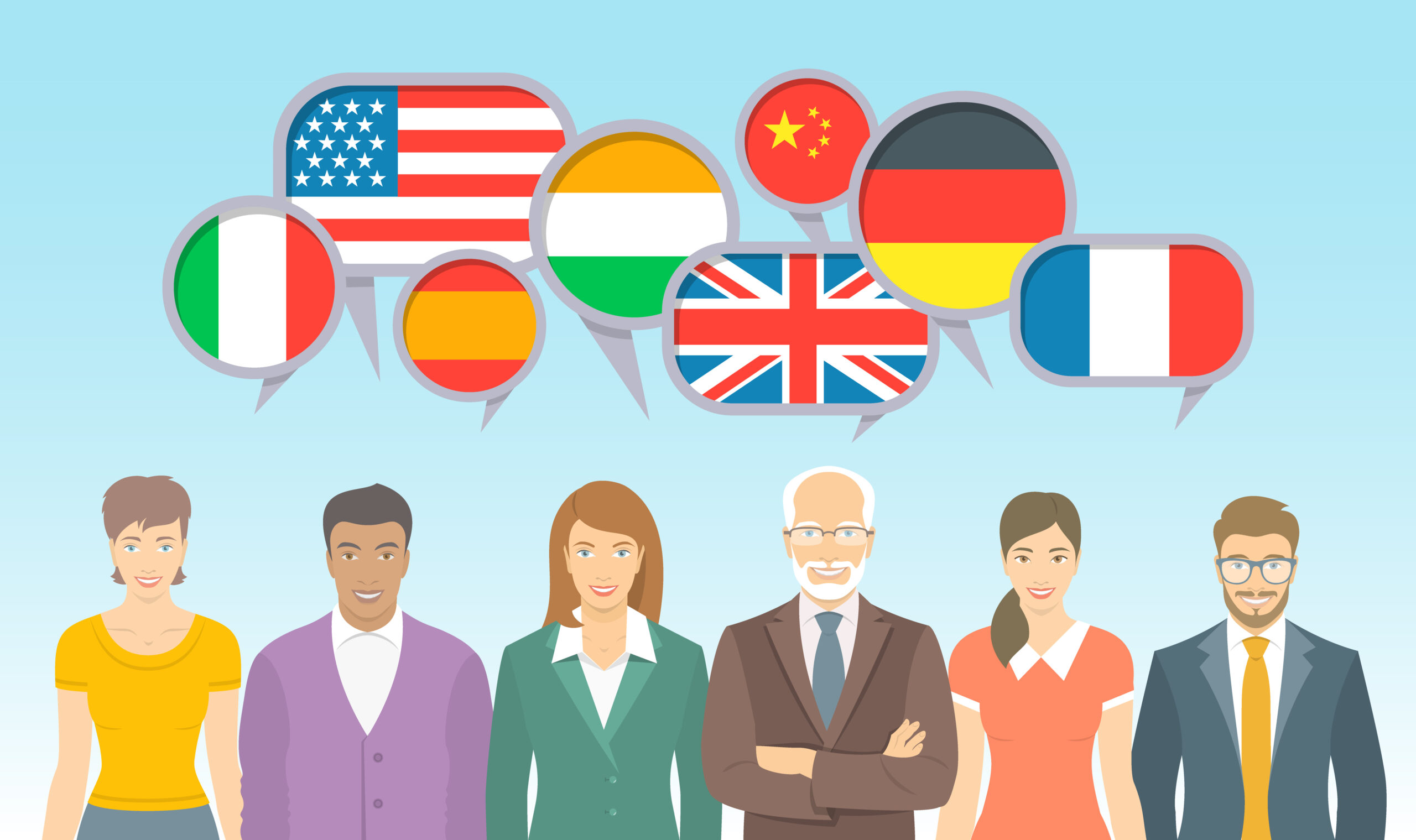
It’s a phrase we hear daily at Fluency Corp:
“If I were a kid, I could easily learn another language, but I can’t do it now.”
While we are in complete agreement that learning to speak a new language is a challenge, we also 100% believe that anyone can do it, at any age. We see language proficiency happen just as it should on a daily basis. Language learning has previously been viewed as academic, but there’s nothing academic about speaking another language. Think about it: we all speak a language. So basic logic tells us we can learn a second one. You’ve done it before, therefore you can do it again.
Most of the people we speak to that are bilingual and became so as adults all have one thing in common: they spoke the language with someone for hundreds of hours. Does it take time? Absolutely. Can anyone do it? Absolutely.
The director of a French cosmetic company told us just last week, “I never took a formal Spanish class when I was relocated to Miami. But now I speak Spanish.” Exposure is the name of the game, as well as the necessity and dedication to speaking. If you can fall back on your first language, you likely will. If you need the language proficiency to get what you want: more clients, food, shelter, friends, job, services, etc., then you will learn.
So, back to convincing you that your company can and should invest employees’ time in another language.
Misconception One: “I’m not a kid anymore. I can’t pick it up like they do.”
This worn out excuse is just scientifically not true (click on link to read the study) and numerous anecdotal experiences support it. For example, a Korean couple was relocated to Plano, TX from Seoul, with their three-year-old in tow. This, as we all know, is the ripe age for starting to form sentences and really getting active speaking. By the age of four, approximately one year after arrival, the child was completely fluent in English. You might be doubtful and say, “In just one year?”
But, let’s do the math. The child spent at least seven hours a day, five days a week, surrounded by English-speaking children, none of whom spoke Korean in Plano, TX. That’s 1,820 hours, well over the 1,000-1,200 hours (for Korean speakers learning English) of conversation needed for fluency. He spoke perfect English (for a four-year-old, of course). So it’s not that children are better at picking up a new language, it’s just that they have the time for it (and don’t self analyze before speaking!). Read more about children and language learning here.
At Fluency Corp we believe that it’s all in your mind (more evidence that adults might even be better at learning a new language!). As a child, you’re not conscious of the learning. As an adult, you’ve learned to be self conscious, and therefore, are more timid to try speaking and afraid to make a mistake. Just as babies don’t scold themselves when they fall down as they’re learning to walk, it doesn’t occur to them beat themselves up when learning a new language.
But adults have something that children do not: the motivation and focus to learn. We believe adults can actually learn more quickly because they want to learn and have goals. Time and possibly too much thinking and self analyzing is the issue, not that you’re over the age of 20.
Misconception Two: “I’ll never sound native and I need to sound like a native.”
Of course you won’t and of course you don’t! How many adults do you know working abroad (and moved abroad after the age of 20) in their second language that sound like native speakers? Only the ones who moved in their teens or before most likely, and we wouldn’t call this an international relocation, now would we?
The best way to a good accent is to listen first and read later (and we define a good accent as one that native speakers can clearly understand, not one that sounds like native speakers necessarily). But, but, but …. I can hear all of you scared adults who want to see the words on the page, learn the grammar rules by heart and conjugate til the cows come home. But, you say, I won’t understand what you’re saying!
Of course you won’t!
At first…
But eventually you do. That’s just a fact.
The reason we mostly have accents is because we are shown the letters before we hear them. So if you’re an English speaker, and I show you the word “Hola” in Spanish, how do you think you’re going to pronounce it? Of course you’re going to make the ‘H’ sound, because you’re applying the rules you have for English and imprinting them on the new language. Why? Because they’re all you have to go by! It’s just logical that you use the knowledge that you already have.
But if someone greets in at the bakery and says the word ‘hola’, there is no way that you will put an ‘H’ sound on it when you repeat it. You didn’t hear an H, so you won’t pronounce an H. You will learn just like every child in the world learned their first language: by listening and repeating, when the context applies.
When learning a second language, don’t start with grammar rules and reading, or you’ll inadvertently give yourself the hardest accent to understand from the very beginning. Believe me, I made this mistake with French at first, before realizing my self-study was going to actually ensure that I would have to relearn everything I thought I was pronouncing correctly when I read French books out loud. Make sure your language instructor focuses on speaking more than grammar rules and reading. You’ll thank us later when people say, “Where did you learn Spanish?! Your accent is incredible!”
Remember: It’s the method of learning that’s the problem, not your mouth.
Misconception Three: “I can learn a new language with software or an app.”
Or, “I can get fluent/proficient/to a good level without speaking or having hundreds of hours of conversations.”
Never going to happen with apps. The only way to get fluent (and I’m talking about 1) you can hold a meeting in the language, 2) you can have dinner with colleagues in the language and 3) you can talk on the phone with someone about anything) is through talking with someone in the second language. There is no shortcut, so stop trying to get around it. I have clients that say, “It’s not the best time right now. Maybe we’ll start in a year.”
Then, they call three years later, and I have to tell them with two hours a week they could already be at level B1 at this point (intermediate proficiency – a darn good level that any adult should be proud of)! You just have to make the commitment and do it. Sure, you’re going to cancel a class here and there, but stick with it.
I’ve been taking Japanese for 4.5 years at roughly two-four hours per week with one intensive course of 80 hours after three years for a rough total of 550 hours over 4-5 years (less than halfway to a strong speaking level). And I will continue with two-four hours per week for another four years. This is the amount of time I have to commit to it, and that’s just how it is. But I will reach a good speaking level – that is sure.
The number one thing that keeps adults from getting fluent? They stop before the miracle happens. It’s like a teenager who decides to take a year off of college. The return rate is abysmal and you hear parents cry in their sleep when their 19-year-old says, “I’m JUST going to take a year off.” It’s incredibly hard to get going again.
But you have to stress to yourself, your team of employees, and the company: having a language strategy allows you to communicate, serve clients and global employees and be a step ahead of your competition.
Even if you miss a class a month, or even two classes a month, do anything but stop classes completely. If you stop before you see the magic happen (aka proficient level of speaking to do business, make friends and expand comfortably into another market), then all that you’ve done before that moment has been almost completely wasted.
You’ve heard the saying, “If you don’t use it, you lose it.” Not unlike a muscle that turns flabby with a sedentary lifestyle, language proficiency fades away when its priority level goes by the wayside. Lest you think I’m impervious to slipping on my own language training, not long ago a client said to me, “Your French has gone downhill.” I had taken four years off from French (granted I had a good excuse as I was learning Japanese). But, I quickly re-enrolled and I’ve gone back to two hours a week of conversation classes online with one of our French Fluency Partners. I certainly cannot lose what took me four years to achieve!
Yes, learning a language is a very long marathon, unless you have ten hours a week to devote to conversation classes, which could get you there in roughly two years. But, it will be worth it. Your employees will have empathy for others having to work in their second language, they will be able to connect with clients in a unique and memorable way, and they’ll be able to collaborate with coworkers across the globe.
Excited to have 1, 5 or 10 employees start working on or improving their 2nd language? Let’s discuss what might be the right strategy for your long term 2nd language communication goals.










